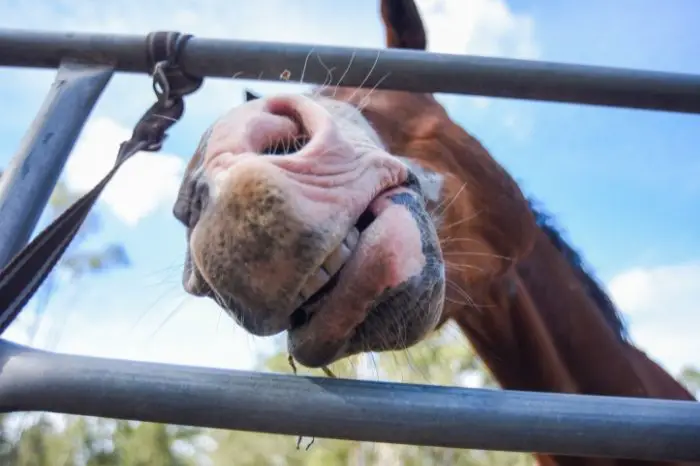Last Updated on February 4, 2022
It is not unusual to see a horse frothing at the mouth, but if your horse has never done it before it can be quite alarming. There are many reasons why a horse might froth at the mouth, so let’s find out more!
What Does It Mean When A Horse Is Frothing At The Mouth?
Horses will froth at the mouth when they have an excessive amount of saliva. There can be a number of reasons for this. Some are part of normal horse behavior, while others are a symptom of medical problems.
It is important to be able to identify the reason why your horse is foaming at the mouth so that you can seek veterinary advice if necessary.
When a horse froths or foams at the mouth, the excess saliva is turned into a white foamy substance. This is due to a substance in the saliva called latherin, which has a similar effect to soap. As the horse chews and moves its lips and tongue the saliva is agitated into foam.
You will see the froth or foam on the lips of the horse, and potentially even falling onto the floor. It is not uncommon for the rider to get covered in foam when the horse shakes its head!
Let’s find out the reasons why a horse might foam at the mouth:
Horse Foaming At The Mouth When Ridden
Is is common to see a horse frothing at the mouth when it is being ridden. Ideally there should be a minimal amount of foam – enough to turn the lips white, but not so much that it splatters the chest of the horse. This foam is generated as the horse works with the bit in his mouth, and a moderate amount of foam indicates a relaxed and happy horse.
If you do not see any foam at all, this is because the horse is tense and in the wrong position to produce saliva. On the other hand, a large amount of foam also indicates a tense horse, as he is not in correct position to swallow his naturally produced saliva.
Horse Foaming At The Mouth When Eating
The act of eating, or anticipation of a tasty meal, will stimulate the mouth to produce extra saliva. As the horse chews, most of this will be swallowed, but you may see some of it around the mouth. This is completely normal and not a cause for concern, as long as the saliva production returns to normal after your horse has eaten his dinner.
Probios Horse Soft Chews, Apple flavor
Medical Conditions That Cause Frothing At The Mouth In Horses
There are several medical conditions where you will see a horse frothing at the mouth. If you suspect that your horse has any of these then it is vital to seek veterinary advice as soon as possible.
-
Dental Problems
Just like in humans, dental problems in horses can be very painful! If a horse has a cracked tooth or even a splinter in his mouth, he will salivate excessively
-
Choke
When a horse has choke, this means that his esophagus has become blocked, normally by food. He will be unable to swallow any saliva he produces, so you will see large quantities of liquid coming from his nostrils and mouth.
-
Throat Problems
When the throat of a horse becomes swollen, he will find it painful and difficult to swallow saliva. This could be due to infectious diseases such as strangles.
-
Infectious Causes Of Excessive Salivation
Some infectious diseases of horses can cause them to produce abnormal amounts of saliva. These include rabies and equine infectious arteritis.

-
Poisoning
Many toxins and poisons will cause excessive salivation. In recent years, many horses have fallen ill with slaframine poisoning, also known as ‘Slobbers’, which causes horses to drool excessively.
Summary – Horse Frothing At The Mouth
So, as we have learned when horse froths at the mouth this can mean a number of different things. These include frothing at the mouth when the horse is being ridden, or he is anticipating a tasty meal, or because of a medical condition. It is important to seek veterinary advice if you are concerned that a medical problem could be the reason that your horse is frothing at the mouth.
We’d love to hear your thoughts on why you might see a horse frothing at the mouth! Does your horse froth at the mouth when he eats a tasty treat? Or perhaps you’ve got questions about medical problems that may cause your horse to froth at the mouth? Leave a comment below and we’ll get back to you!
FAQ’s

Kate Chalmers is a qualified veterinary nurse who has specialized in horse care for the vast majority of her career. She has been around horses since she was a child, starting out riding ponies and helping out at the local stables before going on to college to study Horse Care & Management. She has backed and trained many horses during her lifetime and competed in various equestrian sports at different levels.
After Kate qualified as a veterinary nurse, she provided nursing care to the patients of a large equine veterinary hospital for many years. She then went on to teach horse care and veterinary nursing at one of the top colleges in the country. This has led to an in-depth knowledge of the care needs of horses and their various medical ailments, as well as a life-long passion for educating horse owners on how to provide the best possible care for their four-legged friends.
Kate Chalmers BSc (Hons) CVN, Dip AVN (Equine) Dip HE CVN EVN VN A1 PGCE

